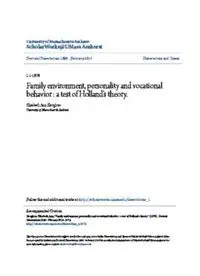
Family environment, personality and vocational behavior : a test of Holland's theory. PDF
Preview Family environment, personality and vocational behavior : a test of Holland's theory.
University of Massachusets Amherst FAMILY ENVIRONMENT, PERSONALITY AND VOCATIONAL BEHAVIOR: A TEST OF HOLLAND'S THEORY A Dissertation by ELIZABETH ANN SLAUGHTER Submitted to the Graduate School of the University of Massachusetts in partial fulfillment of the requirements for the degree of DOCTOR OF PHILOSOPHY Psychology Department March 1978 c Elizabeth A. Slaughter 1978 ALL RIGHTS RESERVED ii , FAMILY ENVIRONMENT, PERSONALTIY AND VOCATIONAL BEHAVIOR: A TEST OF HOLLAND'S THEORY A Dissertation Presented By ELIZABETH ANN SLAUGHTER Approved as to style and content by: Castellano B. Turner, Ph. D. Chairperson of Committee — ACKNOWLEDGEMENTS I am deeply indebted to Dr. Cass Turner for his con- sistent support, not only in this study but throughout my graduate school career. He has contributed his insights, patience and confidence to this study, regardless of the frequency of their necessity. I am appreciative of the guidance and consistent sup- port of the other Committee members: Professors Alfred Southworth, Stanley Moss, and Frederic Finch. My thanks to Betty Hu, computer programmer at Harvard University, who answered all questions—more than once and Paul Segal who gathered later data and helped organize it for this study. My thanks to Dr. Stanley King, clinical psychologist at Harvard University, who furnished much of the data for the original study and gave his support and confidence in the years preceding the completion of this research project. My gratitude and love to my family and friends who knew I would finish. iv ABSTRACT FAMILY ENVIRONMENT, PERSONALITY AND VOCATIONAL BEHAVIOR: A TEST OF HOLLAND'S THEORY April 1978 Elizabeth Ann Slaughter B.A. , Wilkes College M.A. , The New School for Social Research M.A. , University of Massachusetts Ph.D., University of Massachusetts Directed by: Castellano B. Turner, Ph.D. The study sought to compare a measure of family environ- ment (FE) , as defined by nine objective factors, to personality (P) , as measured by the SVIB. These two variables were sub- sequently mathematically joined to form a single dependent variable (FE/P) . This distribution of FE/P congruity was tested in four hypotheses of vocational choice, achievement and success, satisfaction and stability. Utilization of the Holland theory of vocational development presumes support for these relationships. The purpose of the study was to gain information regarding vocational behavior in association with high and low FE/P congruity. The sample, composed of Harvard College men from the classes of 1964 and 1965, is admittedly truncated, but presents some interesting occupational dynamics and a different perspec- V tive on the Holland theory. FE/P congruity is computed through an adaptation of the method previously used by Hol- land and associates. There was no support for the hypothesis of a relation- ship between family environment and personality. The results presume additional and more influential factors within and about FE which affect P, to the extent that Investigative and Enterprising personalities flourish in opposing environ- ments. The results have implications to the use of Holland's theory within a strongly intellectual, financially secure and fiercely competitive sample. There is no support for the hypothesis of a relationship between career choice and the congruity of family environment and personality. The results show that high and low FE/P congruity is not associated with any particular vocational typology, or a combination of similar or adjacent types, or opposite vocational typologies. Holland's research has not tested this hypothesis, though he speculates and generally assumes the joint influence of family environment and person- ality on vocational choice. There was no support for a rela- tionship between achievement and success, and the congruity of family environment and personality among businessmen. The strongest predictor of achievement for this group was the authority surrounding how close one is to the top position within the company. It was associated with low congruity, as were the other measures. vi For physicians, there was an inverse relationship be- tween achievement and congruity. Responsibility for super- vising interns, hospital administrative duties, a high pres- tige specialty, completed training and a suburban practice were associated with low congruity. High congruity was sig- nificantly related to exclusive involvement in private prac- tice. There was no support for a relationship between achieve- ment and the congruity of family environment and personality among university teachers. The strongest predictor for this group, however, was academic rank. Among lawyers, low congruity was significantly related to the subspecialty of corporate law and working alone rather than jointly. High congruity was significantly related to the subspecialties of family law, estate law and pro bono work. There was near-Significance of a relationship between high income and low congruity. Therefore, the relationships of achievement to congruity are predominantly inverse among businessmen, professors and physicians, and linear between lawyers. Because of the number of areas in which they achieve, low FE/P congruity is assumed to develop within a stable, supportive social climate where independence, curiosity, sociability, acquisitiveness and risk-taking are rewarded. This group may be similar in devel- opmental history to creative individuals. Holland's theory, therefore, may have a different relationship to highly autono- mous and creative individuals. High congruity persons may have different childhood experiences from low congruity and vii choose areas, especially in law, to compensate needs involving rules and authority. The results support slightly a relationship between satisfaction and congruity. Low congruity was associated with job satisfaction, while high congruity was associated with being unhappy or depressed, low pay, and having a job which takes too much time. There was no support for a relationship between stability and congruity. This has positive implications since job mo- bility is necessary in early stages of a career. viii
